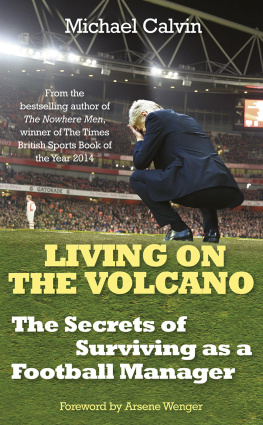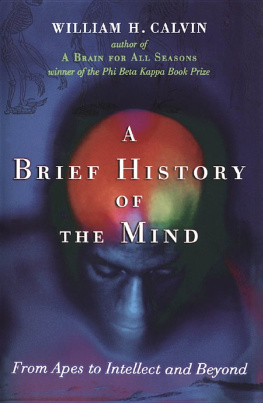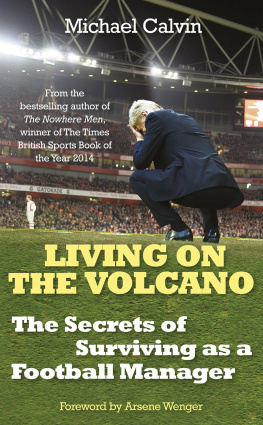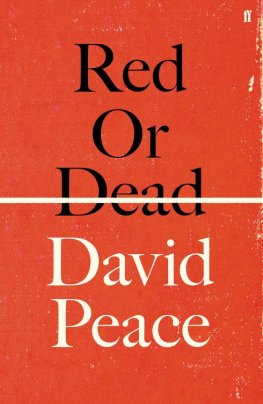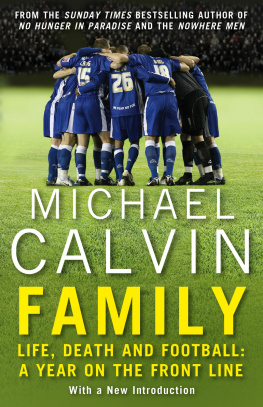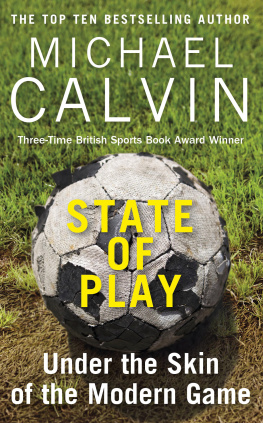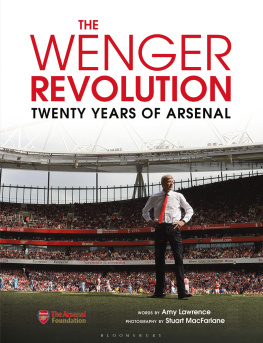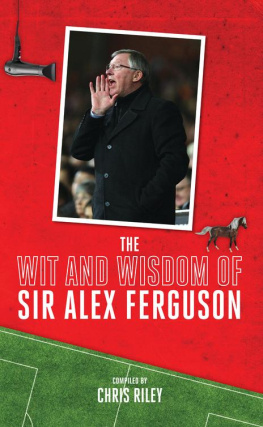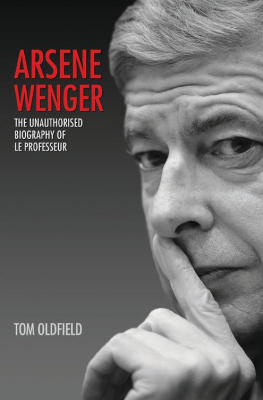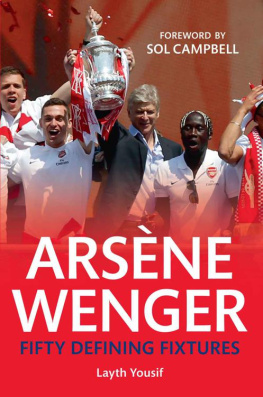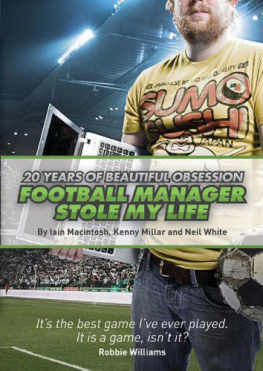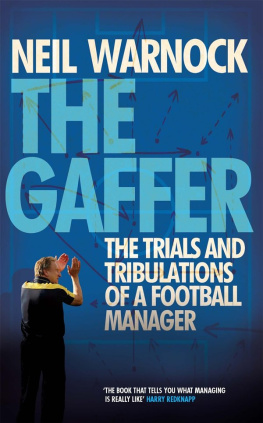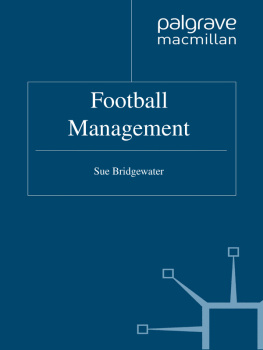Contents
Contents
About the Author
Michael Calvin is one of the UKs most versatile sports writers, having worked in more than eighty countries, covering seven summer Olympics and six World Cup finals. He was named Sports Writer of the Year for his despatches as a crew member in a round-the-world yacht race, and has twice been named Sports Reporter of the Year. He is currently chief sports writer with the Independent on Sunday, and has held similar positions at the Daily Telegraph, The Times and the Mail on Sunday. His last book, The Nowhere Men, won The Times British Sports Book of the Year award in 2014.
About the Book
This is a book about football managers, live and uncut. The average lifespan of a manager in the Championship is eight months. New records for volatility are set every season.
What makes these men tick? They are familiar figures, who rarely offer anything more than a glimpse into their personal and professional lives. Who are they? What shapes them? How and why do they do their job? Award-winning writer Michael Calvin provides the answers.
Also by Michael Calvin
Family: Life, Death and Football
Lifes a Pitch
Only Wind and Water
The Nowhere Men
Proud: My Autobiography (with Gareth Thomas)
For Mum and Marielli. Golden links in the chain.
Living on the Volcano
Michael Calvin

Foreword by Arsne Wenger
MANAGING A FOOTBALL team has changed dramatically over the 30 years or so since I first took charge of a first team, in France with Nancy.
The challenges for a modern day manager are consistently evolving. Football is ever-increasingly popular, worldwide. It is watched by millions and involves heavy investment by broadcasters and commercial organisations alike.
However, the fundamentals of a successful football manager remain the same. There are many factors in measuring that success, but the key ingredients will always be the passion an individual has for the sport; man management; the ability to evolve and adapt; and, of course, an eye for talent.
I have respect for every single manager in football, throughout all levels, as we all suffer. We are all striving for the perfect performance and the perfect season, and we all feel the intense pain after every defeat. That is why it is so important to try to enjoy those short post-match victorious moments as much as we can, before our minds move to the next match.
There is a growing trend within the game for clubs to change managers more frequently, as there is so much pressure for short-term results. I am always sad when a manager loses their job. Clubs need stability, and having been at Arsenal for almost 19 years now, I have been given the time to create a culture at the club, which is so important.
Although it is often challenging, I have enjoyed every minute of being a manager of a football club. I grew up in a football environment, as my parents ran a restaurant bar in Alsace, in France, where all the local football teams would congregate before and after matches. I grew up around football people. I enjoyed listening and learning from them and this gave me my passion for the game.
Im really looking forward to reading this book, a study of a completely unique way of living being a football manager.
Best wishes,

Arsne Wenger
1
Intolerance of Uncertainty
A PADDED ELECTRODE was placed on either side of Martin Lings head. He was emotionally exhausted, still and submissive. His world was dark, denuded of basic human comfort. His final sentient thought, as he lost consciousness following an anaesthetising injection in his right wrist, was: I hope this works.
Electroconvulsive therapy, or shock treatment to use the term which has enduring echoes of the asylum, involves triggering an epileptic fit by passing an electric current through the brain. The aim is to combat severe depression, but the procedure is increasingly unfashionable, since it is ineffective in around half of patients and relapses are common.
Once Ling was unconscious, another injection, containing a muscle relaxant, was administered. A mouth guard was inserted, to prevent him biting his tongue. A series of high-voltage surges, up to 70 pulses a second for between three and five seconds, caused his body to stiffen. Each seizure lasted between 20 and 50 seconds.
He went through the process five times, at the Priory Hospital in Roehampton in early 2013, after enduring a series of acute panic attacks, during which he was convinced he had a brain tumour and was suffering a cardiac arrest. He had fleeting thoughts of suicide, of running into traffic on the northbound carriageway of the M5 in Somerset, or steering his car into the path of an oncoming lorry on the A10 near his home in Hertfordshire.
ECT is barbaric, but only people who have been that low will understand you will try anything in that situation, he says, in a muted monotone which testifies to the latent power of reminiscence. You go into a black hole. It feels like you are living in a fog. You can see nothing. It is so black, totally black. It is as if the world is going to end.
Ling is an unobtrusive figure as he sits, drinking a tall, slender cup of latte, in the bar area of the suburban hotel in which he used to conduct individual interviews with prospective players for the three clubs he managed over the course of a decade, Leyton Orient, Cambridge United and Torquay United. Football is his life force, his workplace.
He prides himself on the accuracy of his untutored insight into the human condition, his instinct for weakness and the effectiveness of his compassionate approach to the insecurities of the lower-division footballer. He looks younger than his 48 years, despite the grey hair which frames a boyish face, reddened by the exertions of an afternoons coaching on a clear, cold February day in 2015.
My man management is the best part of my management. It is the most important part of the job, because at the clubs Ive worked weve had to take some wrong uns that others wouldnt touch. I know I can find someones onoff switch. In the lower leagues you have to be absolutely everything to all men. I have always believed in honesty, in creating the right atmosphere.
He understands the complexities of candour, the stigma his story represents in a profession underpinned by desperate ambition, absurd pretension and ritual sacrifice. Admissions of a history of mental health issues are, he admits, a coffee stain on a strong CV. They deter potential employers, who have bought into the mythology of modern football management.
Men like Ling are expected to be a cross between a sage and a stand-up comedian, a patriarch and a pithead rabble-rouser. They are prisoners of perversity, expected to dispense summary justice despite being utterly disposable. Their names and faces are overfamiliar, due to the tyranny of a ceaseless news cycle, yet they remain resistant to anything other than superficial scrutiny.
They have the trappings of cartoon kings, with courtiers who dance attendance, oblivious to the irrelevance of their self-importance. They are accustomed to addressing the public on their own terms, and tend to shy away from substantive analysis of their personal and professional priorities.

